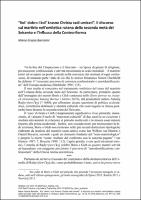Chapter “Kol’ dobro i kol’ krasno Christa radi umirati”. Il discorso sul martirio nell’omiletica rutena della seconda metà del Seicento e l’influsso della Controriforma
| dc.contributor.author | Bartolini, Maria Grazia | |
| dc.date.accessioned | 2022-09-15T20:06:02Z | |
| dc.date.available | 2022-09-15T20:06:02Z | |
| dc.date.issued | 2019 | |
| dc.identifier | ONIX_20220915_9788864539102_35 | |
| dc.identifier.issn | 2612-7679 | |
| dc.identifier.uri | https://library.oapen.org/handle/20.500.12657/58239 | |
| dc.language | Italian | |
| dc.relation.ispartofseries | Biblioteca di Studi Slavistici | |
| dc.subject.classification | thema EDItEUR::J Society and Social Sciences::JH Sociology and anthropology::JHB Sociology | en_US |
| dc.subject.other | Martyrdom | |
| dc.subject.other | Boris and Gleb | |
| dc.subject.other | Antonij Radyvylovs’kyj | |
| dc.subject.other | Lazar Baranovyč | |
| dc.subject.other | 17th-century Ukrainian Literature | |
| dc.title | Chapter “Kol’ dobro i kol’ krasno Christa radi umirati”. Il discorso sul martirio nell’omiletica rutena della seconda metà del Seicento e l’influsso della Controriforma | |
| dc.type | chapter | |
| oapen.abstract.otherlanguage | This article investigates the rhetoric of martyrdom that developed in seventeenth-century Ukraine and specifically the discourse of Orthodox martyrdom as elaborated by Ukrainian Baroque preachers in recounting the life and death of the martyrized princes Boris and Gleb. We focus in particular on one exemplary case, that of Antonij Radyvylovs’kyj’s Slovo pervoe na sviatyx strastoterpec kniazej Borisa i Gleba (Kyiv, 1676). Tracing the contours of specific ideologies of martyrdom that arose in 17th-century Kyiv, we also address the issue of interconfessional encounters, in particular those taking place along the Orthodox-Catholic divide. | |
| oapen.identifier.doi | 10.36253/978-88-6453-910-2.04 | |
| oapen.relation.isPublishedBy | bf65d21a-78e5-4ba2-983a-dbfa90962870 | |
| oapen.relation.isbn | 9788864539102 | |
| oapen.series.number | 43 | |
| oapen.pages | 11 | |
| oapen.place.publication | Florence |

